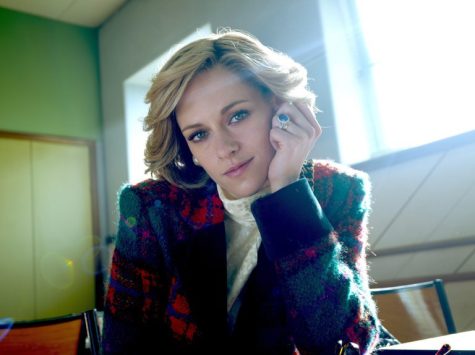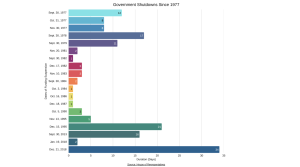“Spencer” movie review: Kristen Stewart rediscovers Princess Diana

Check out The Lasso’s new column, Now Showing, where Ben Saito Barwig reviews films.
November 13, 2021
The biopic is one of cinema’s most delicate genres. Bringing a figure with historical or cultural significance to the big screen is no easy task. It takes more than just a recounting of events in their lives, which many biopics only seem to do. The purpose of a biopic as it relates to cinema is to gain a deeper understanding of the human experience by relating it to the most visceral and emotional of all characters: the real person. I am more than happy to report that “Spencer” does just that.
The film takes its first step towards succeeding in the “biopic realm” by only portraying a small glimpse into the life of Princess Diana: a three day period in 1991 spanning Christmas Eve, Christmas, and the day after, in which she joins the rest of the royal family in Sandringham to ceremoniously celebrate the holidays. The film more specifically follows her decision to leave her husband, Prince Charles, and all the press that surrounds them. I see the decision to only portray this pocket of her life as a successful one because it allows a much more intrinsic and sentimental look at who she is, avoiding the exposition and pacing problems that come with the baggage of trying to incorporate the rest of her life. In the hands of a lazier writer, it would be easy to create a soap opera and rush through Princess Diana’s experiences, making for a seemingly perfect climax in her tragic death, but Steven Knight’s script doesn’t go the easy route. It’s creative, in more ways than one.
Creativity is very hard to come by in the biopic genre. How does one infuse any auteurisms into a retelling of a person’s life without tarnishing or diminishing the real events? A film like Paul Schrader’s “Mishima: A Life in Four Chapters” is a perfect example of how to do this, with the film encompassing writer Yukio Mishima’s spanning works through diorama-like glimpses into his stories, portraying a hidden beauty as well as stunning set design and art direction. “Spencer” gets creative as well, although not as perfectly as “Mishima”. Through psychological scenarios that Diana plays out in her mind, “Spencer” takes an almost Lynchian turn. A juxtaposition of the strict and draining order found in this royal setting with liberating yet foul sequences of Diana’s desires hammer home a core sentiment: the inner child, trapped by the patriarchal royal family.

Unfortunately “Spencer” does falter in one common pitfall of the biopic: the other characters being lesser. Luckily, it’s only in a few. An example is Sally Hawkins’ character, who, while giving a great performance, ends up feeling almost toolish. She ultimately serves as a device for Diana’s story, rather than a companion, which I believe is what Steven Knight was trying to do.
Additionally, I don’t think that everyone will enjoy the film as much as I did. Director Pablo Larrain isn’t afraid to take his time, and I imagine that the runtime and slow pacing can weigh on many people. Larrain clearly cares deeply about telling this story as authentically and immersively as possible, and he isn’t afraid to draw out many segments as needed. This is a Pablo Larrain film and he makes it his own, which personally, I valued deeply.
What will grab many people is likely Diana being portrayed by Kristen Stewart, the lead of the infamous “Twilight” trilogy. I hope that those who doubt her will come to find that, much like her “Twilight” co-star Robert Pattinson, she has completely reinvented herself as an actress since, and her Diana is no doubt my favorite performance of the year. She truly disappears into this role. I found many times during the screening I would become so immersed that I would forget that it was Kristen Stewart behind the costume. Her losing Best Actress at the upcoming Academy Awards would be a true travesty. In a film that very much relies on a solid performance from the lead, Kristen Stewart delivers spectacularly.
I would also like to gush about the cinematography and score of “Spencer.” Claire Mathon gives some of the best camerawork of the year. Her cinematography captures the foggy countryside of England in a rich beauty, matched by a grainy and antiquated look that reflects the grainy and antiquated traditions of the royal family that impact Diana. Johnny Greenwood of “Radiohead” fame is quickly emerging as one of cinema’s finest modern composers, with his work on the “Spencer” score being the best film score of his career, outmatching his works on “There Will Be Blood” and “Phantom Thread.” The two sides of Diana’s life and the theme of duality that is ever present in the film is matched by intense piano tracks and trippy jazz compositions, creating a pendulum of order and chaos.
With a liberating script and airtight direction, “Spencer” was already a fantastic film, but when Kristen Stewart gives the best performance of the year accompanied by such fantastic production, “Spencer” rises to be one of the best films of the year.
If you are unsure of whether or not you will be in for the slow pace, check out Pablo Larrain’s other defining biopic “Jackie,” with Natalie Portman’s portrayal of Jackie Kennedy being a great introduction to his style of filmmaking. If you’ve seen “Spencer” and are hungry for more psychological biopics, see “Mishima: A Life in Four Chapters,” which is not only the best biopic I’ve seen, but one of the greatest movies I’ve ever seen, period. If you liked the cinematography, try Claire Mathon’s even better work on “Portrait of a Lady on Fire.”
I highly recommend “Spencer,” as it is one of the best biopics of recent years. And if you’re willing, buy a ticket. Drive to a theater. Sit in your seat. If you can do all that, then I promise, by the time the credits roll and the lights turn back up, you will feel changed.
4.5/5







